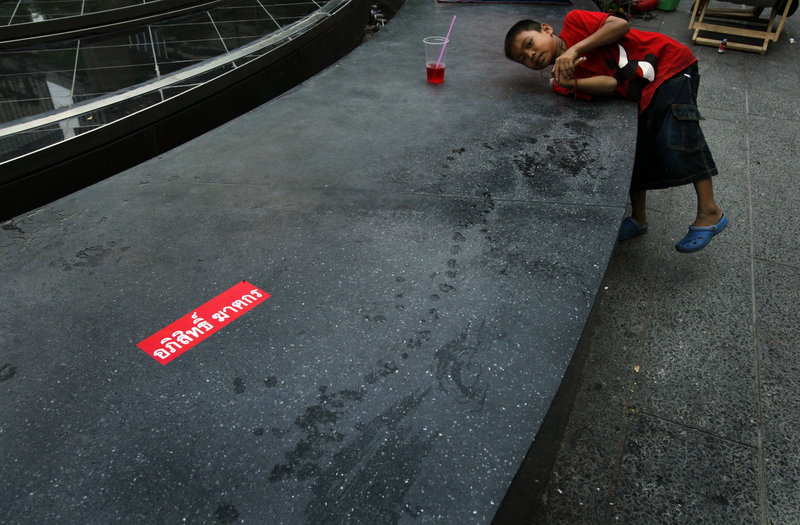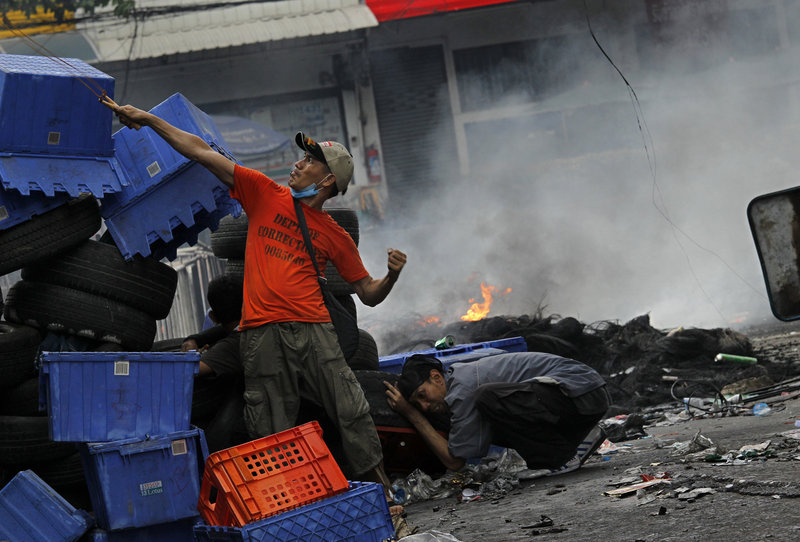BANGKOK – Anti-government unrest boiling over in downtown Bangkok spread to other areas of the capital and Thailand as the military defended its use of force in a crackdown that has left 30 civilians dead in four days. Thai leaders flatly rejected protesters’ demands that the United Nations intercede to end the chaos.
Rapid gunfire and explosions echoed before dawn today outside the luxury hotels bordering the barricaded protest zone, where the military has attempted to seal in thousands of demonstrators camping in the downtown streets. Guests at the upscale Dusit Thani hotel were rushed to the basement for safety.
On Sunday, towering plumes of black smoke hung over city streets where protesters set fire to tires, fired homemade rockets and threw gasoline bombs at soldiers who used rubber bullets and live ammunition to pick off rioters who approached their lines. Army sharpshooters crouched behind sandbags carefully taking aim and firing to keep attackers at bay.
Leaders of the protesters, who have dubbed themselves Red Shirts, said they wanted talks mediated by the United Nations, provided the government agreed to an immediate cease-fire and pulled its troops back.
Government spokesman Panitan Wattanayagorn, however, said a pause was unnecessary since troops were “not using weapons to crack down on civilians.” The government maintains it is targeting only armed “terrorists.”
Authorities insisted they would continue the crackdown aimed at choking off the Red Shirts, who have occupied a 1-square-mile protest zone — barricaded by tires and bamboo spikes — in one of Bangkok’s ritziest areas since early April. The protesters are demanding that Prime Minister Abhisit Vejjajiva resign immediately, dissolve Parliament and call new elections.
The political conflict is Thailand’s deadliest and most prolonged in decades, and each passing day of violence deepens divides in this nation of 65 million — a key U.S. ally and Southeast Asia’s second-largest economy. Thailand has long been considered a democratic oasis in Southeast Asia, and the unrest has shaken faith in its ability to restore and maintain stability.
Soldiers have encircled the core protest site and cut off utilities to the area, which was largely free of violence most of Sunday. Protest leaders told women and children with them to move to a Buddhist temple compound within the zone.
The areas between the site and the military’s perimeter have become a no-man’s land where gunshots and blasts can regularly be heard. But some of the worst clashes Sunday were behind the military cordon — an indication the unrest was not contained within the protest area and was spreading.
There were also reports of scattered unrest outside the capital. A military bus was burned in the northern city of Chiang Mai and protesters demonstrated in the northeastern towns of Nongkhai and Udon Thani to defy the government’s state of emergency, which bans gatherings of more than five people.
The decree, which gives the army broad powers to restore order, was extended Sunday to 22 of Thailand’s 75 provinces, up from 17.
According to government figures, 59 people have died and more than 1,600 have been wounded since the Red Shirts began their protests in March. The toll includes 30 civilians killed and 232 injured since Thursday in fighting that has turned parts of central Bangkok into a battle ground.
Send questions/comments to the editors.




Success. Please wait for the page to reload. If the page does not reload within 5 seconds, please refresh the page.
Enter your email and password to access comments.
Hi, to comment on stories you must . This profile is in addition to your subscription and website login.
Already have a commenting profile? .
Invalid username/password.
Please check your email to confirm and complete your registration.
Only subscribers are eligible to post comments. Please subscribe or login first for digital access. Here’s why.
Use the form below to reset your password. When you've submitted your account email, we will send an email with a reset code.